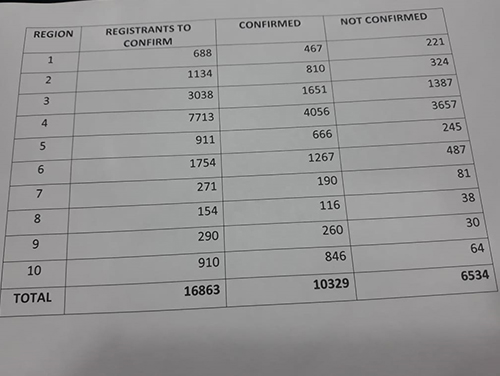The Guyana Elections Commission (GECOM) was unable to locate 6,534 of the 16,863 new registrants recorded during the truncated national house-to-house (HtH) registration exercise.
According to information released last evening by GECOM’s Public Relations Officer (PRO) Yolanda Warde, 10,329 registrants were verified, while 6,534 were not. Warde said that those 6,534 persons could not be verified for various reasons, including not being home when GECOM operatives and scrutineers from political parties visited.
Based on the breakdown provided, Region Four accounted for the largest number of unverified registrants, with 4,056 (52.6%) of 7,713 registrants verified, while 3,657 (47.4%) unverified. Region Three accounted for the second largest number, with 1,651 (54.3%) of 3038 registrants verified and 1,387 (45.7%) unverified.
In an exercise which started last Thursday and ended on Sunday, the 16,863 supposedly new registrants recorded during the truncated HtH registration exercise were scheduled to receive visits to verify that they are indeed first-time registrants. Opposition-appointed commissioners of GECOM had demanded the verification exercise, citing the fact that a list of over 20,000 allegedly first-time registrants from the HtH exercise was found to contain names that were already on the National Register of Registrants (NRR).
It is not clear what GECOM would decide now given the significant number of persons who remain unverified.
On Sunday, Chief Scrutineer for the People’s Progressive Party Civic (PPP/C), Zulfikar Mustapha, had expressed optimism that GECOM would be able to reach all of the persons earmarked for verification, even though he acknowledged that on several occasions, persons were not home during visits.
Meanwhile, government-nominated GECOM Commissioner Vincent Alexander had told Stabroek News that regardless of whether or not the 100 per cent verification is achieved, GECOM must make do with whatever number it was able to verify as “nothing must interfere with the commission’s election timelines.”
There was no word from GECOM yesterday on whether the time for verification will be extended.
Alexander had been adamant that no extension should be granted, saying that this would interfere with the commission’s timelines. “Nothing should interfere with the original deadline,” he had said, while emphasising that the verification exercise serves no purpose. “The PPP/C refused to participate in house-to-house registration. Nobody denied them. They did not send scrutineers. Now, the court has decided that house-to-house was legal, they are now asking for what they did not do when they had a right and chance to do so,” Alexander lamented.
Last week, by a majority comprising opposition-nominated members and Chairperson Justice (ret’d) Claudette Singh, GECOM decided to undertake a four-day field verification of all the new registrants recorded during the truncated national HtH registration exercise.
GECOM had initiated a HtH registration exercise in July but this was truncated by Singh following a ruling by the Chief Justice that the exercise could not be used to create a new NRR.
Singh has, however, repeatedly maintained that since the CJ also ruled that the HtH process was legal, it would be treated as a “verification” process and the information collected would be added to the NRR in keeping with the terms spelled out in the National Registration (Amendment) Act of 2005. This act provides at Section 6 (1) that “it shall be lawful for the Commission by order with effect from a specific date to authorize the registration of all persons who are qualified to be electors; and all other persons in Guyana of the age of fourteen years and over, and such registration shall continue and be conducted in such manner and at such time as the Commission shall direct, suspending temporarily for periods prescribed by the Commission”.
Section 6 (6A) of the same Act also provides that the Elections Commission shall use the Official List of Electors from the 2001 General and Regional Elections as the base to commence continuous registration provided that at any stage the commission may undertake such verification as necessary by a means to be determined by the commission.










